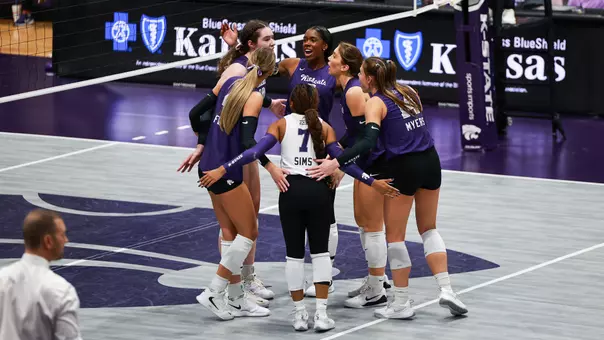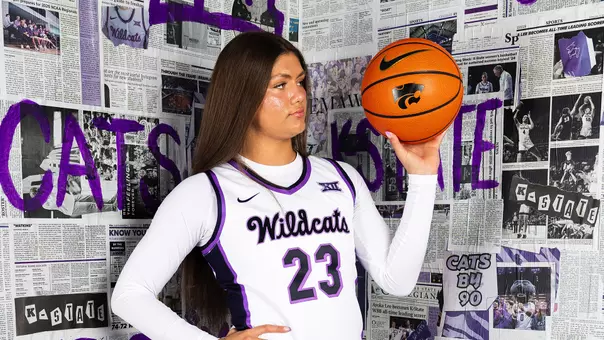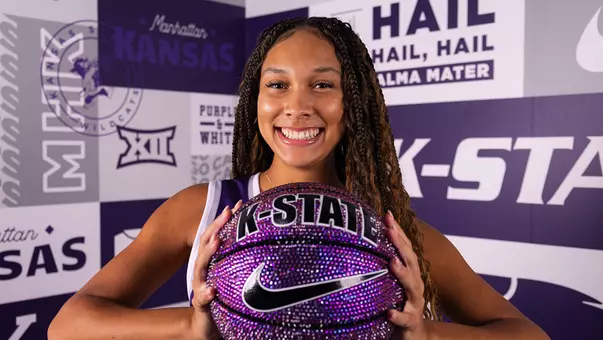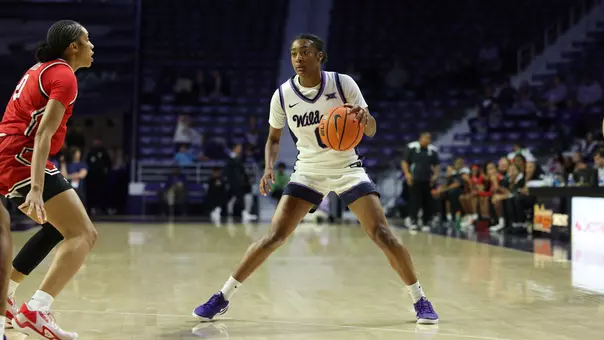Kansas State University Athletics
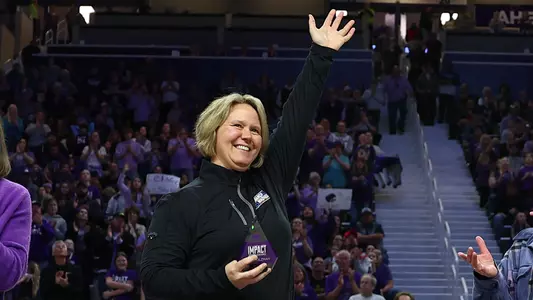
Impacting Today’s Student-Athletes
Feb 12, 2024 | Women's Basketball, Sports Extra
By: D. Scott Fritchen
Kansas State Athletics honored an outstanding alum as it presented the 2024 IMPACT Award to Lynn Holzman, a 1994 K-State graduate who serves as Vice President of Women's Basketball at the NCAA, at the K-State women's basketball game on Saturday.
The IMPACT Award is a part of the National Girls and Women in Sports celebration. The K-State Girls and Women in Sports IMPACT Award was established to recognize a member of the K-State Family who has directly impacted the lives of girls and women through the power of sport.
Holzman, who spent an initial 16-year stint at the NCAA prior to returning to the NCAA in February 2018, was a K-State women's basketball player from 1991-94. She played in 95 games with 39 starts for the Wildcats.
Holzman is responsible for the strategic direction, oversight, operations and management of women's basketball in Division I, II and III. She serves as the primary liaison to the women's basketball committees and provides strategic oversight of the site-selection process for each championship.
In 2014, Holzman was appointed commissioner of the West Coast Conference after serving in various leadership roles within the conference office, including executive senior associate commissioner/chief operating officer and senior associate commissioner of governance and administration. Before her conference office tenure, she worked at the NCAA office for 16 years, last serving as a director of academic and membership affairs.
Holzman received a bachelor's degree in exercise science from K-State, a master's degree in sport administration from North Carolina and a Master of Business Administration from Purdue.
K-State Sports Extra's D. Scott Fritchen spoke with Holzman about her professional career and her honor as the IMPACT Award recipient:

D. Scott Fritchen: What does receiving the IMPACT Award mean to you?
Lynn Holzman: I am really and truly honored to be recognized for the IMPACT Award. Being the third recipient, and being recognized because of obviously been a part of this program that is doing very well right now, the underlying purpose of the award is to recognize someone that has impacted girls and women in sports, and that's the core of who I am and it's what I've dedicated my life to. I'm very honored.
Fritchen: What comes to mind when you think of K-State?
Holzman: I think of a transformational period of my life being a college student and playing women's college basketball there, going away from home in North Royalton, Ohio, and going to college, and it was after I finished my basketball career that I realized that I wanted to pursue a career in athletic administration. I earned a degree in exercise science. My time at K-State was transformational. I loved my teammates. I loved the opportunity to play at a higher level. Our program between 1990 and 1994 had ups and downs of success but it was a time spent with teammates and that's what athletics is all about. It's at a higher stage when you have an opportunity to be a student-athlete and the community that's developed around sports is immeasurable.
Fritchen: Growing up in North Royalton, Ohio, why did you choose to attend K-State?
Holzman: K-State recruited me. I was actually recruited for three different sports coming out of high school: volleyball, basketball and softball. I knew I wanted to play basketball because I'd receive a full athletic scholarship, and that was a means to getting an education for me. I was recruited by a whole lot of different sports throughout the country, and ultimately when I got down to my last four or five choices, it was really the experience I had on my official recruiting trip that solidified my decision to go to K-State versus some of the other schools that I looked at.

Fritchen: What made you interested in sports administration?
Holzman: With exercise science, I was there at the time that there was a transition and they created the Department of Kinesiology, so I moved to the science-based side of the human body and human movement. I knew I wanted to stay involved in sports somehow. It was during the summers that I worked for the K-State Athletic Department. My fifth year at K-State I worked for the K-State Athletic Ticket Office. Through that experience I did some projects for then-athletic director Max Urick in 1994-95. I started seeing and experiencing really what happened behind the scenes in athletics and in events, and that really inspired me. At the ticket office, all the concerts, the men's and women's basketball games, season tickets for football, I managed the phones and crossed paths with Urick and other administrators to see what I could be potentially. Learning the operation side of the events really provided the inspiration to work in athletics, because it meant so much to me. It was the fiber of who I was and am.
My eyes were open to opportunities through that experience. Urick gave me a Title IX project. I had an interest in coaching as well, as I coached youth basketball, so I pondered the next steps. It really was the interaction with Urick that influenced me to look at a master's program for Sports Administration. I received my Sports Administration degree at North Carolina, Chapel Hill, and I was appointed to be a NCAA intern while at graduate school. From there, I was hired full time at the NCAA national office in 1996, and while I was working full time, I also received my MBA from Purdue University.
Fritchen: What do you enjoy most about serving as Vice President of Women's Basketball?
Holzman: With my position, I am able to help guide and shape women's college basketball, a sport that transformed my life. I'm able to draw on all of those experiences from being a student-athlete, from working at the NCAA national office with the Women's Basketball Coaches Association, from serving as a conference commissioner, to bring that into this position.
When I began serving at this position in 2018, we were really at a tipping point where you could see the potential for growth and see the potential around the championship, but you needed someone to help guide and shape that to bring stakeholders along with it. I enjoy the process of that because I believe what we're doing has very positively impacted the sport and its growth, but also the platform that our student-athletes have through the women's basketball championship and the women's Final Four. To me, that's what drives me, is to provide these opportunities for our student-athletes to perform at the highest levels.
Fritchen: What are the biggest challenges?
Holzman: Around this National Girls and Women in Sports Day, I think the challenge continues to be where women's sports fits within our American sports culture. We've made tremendous, tremendous strides with fans watching broadcasts and going to games and supporting women in sports to the point where it is a sound economic business model and it's not a charity case. It's not just for the benefits of what it means when you play sports, you can also be an executive and manage within sports, but the challenge continues to be to combat these preconceived notions around girls and women in sports around our country.
The storylines we've seen this year and the last couple years around women's basketball, the growth of the championship and viewership and economic value that's now associated with our women's basketball championship responds to a lot of those challenges, and with that the fight and advocacy role that we have to play. For women's basketball, in particular, we have a responsibility to help lead other women's sports. There's enough room for all of us, men's sports and women's sports at the table, but we have a responsibility that as we continue to grow, sports such as volleyball and softball, we must bring them along and we all must be at the table and celebrate the opportunities of our student-athletes. There is now a business model associated with that.
You see that with the NCAA's announcement recently with the new ESPN agreement, and within that agreement, which is slightly under eight years for $1 billion, women's basketball is highlighted and that's an annual average value of $65 million per year with a net agreement. It's the cornerstone, but within it also because of the increased popularity of volleyball, softball and others, those are specifically called out as championships that we'll continue to build and grow. That's a storyline right now, so that's been a challenge, to put ourselves into a position to have that narrative that we're valuable and important, and that's not just because it's a thing to do, but it's the right thing to do, and in fact, it's a good business model.

Fritchen: What is the most gratifying aspect of your job?
Holzman: The most gratifying thing is when we're at the Women's Final Four and you see the stage that you've provided for our student-athletes to perform at their highest level and to crown a national champion. There is nothing like it. Right now, I get chills thinking about it. I never had the opportunity when I played basketball to be in the NCAA Championship, so to be in a position where I can afford those opportunities and have a role for other student-athletes and for basketball is so gratifying.
Fritchen: Who were some people who impacted you the most growing up?
Holzman: Of course, it's the coaches I had growing up. I grew up on a small farm and with my family sports was a way when we played baseball, softball, kickball or basketball and football that we interacted as a family. My siblings were very influential, my coaches, and quite frankly, seeing women athletes the few, few times they were on TV was very impactful. I remember in high school seeing Cheryl Miller and USC in the women's basketball championship. One women's game was on TV that year and that was the national championship game. The fact that I could see a female athlete on a broadcast of that caliber was so important. That's why if you can see her, you can be her and that's why it's so important to have visibility for women and men and women of color because that represents our student-athlete populations.
Fritchen: What advice do you have for others?
Holzman: My advice or my ask is to watch and support women in sports, that is, women in sports that are playing, women in sports who are coaching men's sports, women in sports who are coaching women's sports. Be supportive. It's important for the next generation. It's important for daughters and sisters and everything else. Right now, it's pretty amazing to see these athletes, so do what you can to provide visible support.
Fritchen: What have you learned most about yourself during your journey?
Holzman: A lot. I have learned that the values that are inherently part of you are those things that are going to guide you through the greatest times but also the most difficult times. And during those times, who you are as a person, your integrity, your commitment, your authenticity, all of those things is what is going to carry the day.
Kansas State Athletics honored an outstanding alum as it presented the 2024 IMPACT Award to Lynn Holzman, a 1994 K-State graduate who serves as Vice President of Women's Basketball at the NCAA, at the K-State women's basketball game on Saturday.
The IMPACT Award is a part of the National Girls and Women in Sports celebration. The K-State Girls and Women in Sports IMPACT Award was established to recognize a member of the K-State Family who has directly impacted the lives of girls and women through the power of sport.
Holzman, who spent an initial 16-year stint at the NCAA prior to returning to the NCAA in February 2018, was a K-State women's basketball player from 1991-94. She played in 95 games with 39 starts for the Wildcats.
Holzman is responsible for the strategic direction, oversight, operations and management of women's basketball in Division I, II and III. She serves as the primary liaison to the women's basketball committees and provides strategic oversight of the site-selection process for each championship.
In 2014, Holzman was appointed commissioner of the West Coast Conference after serving in various leadership roles within the conference office, including executive senior associate commissioner/chief operating officer and senior associate commissioner of governance and administration. Before her conference office tenure, she worked at the NCAA office for 16 years, last serving as a director of academic and membership affairs.
Holzman received a bachelor's degree in exercise science from K-State, a master's degree in sport administration from North Carolina and a Master of Business Administration from Purdue.
K-State Sports Extra's D. Scott Fritchen spoke with Holzman about her professional career and her honor as the IMPACT Award recipient:

D. Scott Fritchen: What does receiving the IMPACT Award mean to you?
Lynn Holzman: I am really and truly honored to be recognized for the IMPACT Award. Being the third recipient, and being recognized because of obviously been a part of this program that is doing very well right now, the underlying purpose of the award is to recognize someone that has impacted girls and women in sports, and that's the core of who I am and it's what I've dedicated my life to. I'm very honored.
Fritchen: What comes to mind when you think of K-State?
Holzman: I think of a transformational period of my life being a college student and playing women's college basketball there, going away from home in North Royalton, Ohio, and going to college, and it was after I finished my basketball career that I realized that I wanted to pursue a career in athletic administration. I earned a degree in exercise science. My time at K-State was transformational. I loved my teammates. I loved the opportunity to play at a higher level. Our program between 1990 and 1994 had ups and downs of success but it was a time spent with teammates and that's what athletics is all about. It's at a higher stage when you have an opportunity to be a student-athlete and the community that's developed around sports is immeasurable.
Fritchen: Growing up in North Royalton, Ohio, why did you choose to attend K-State?
Holzman: K-State recruited me. I was actually recruited for three different sports coming out of high school: volleyball, basketball and softball. I knew I wanted to play basketball because I'd receive a full athletic scholarship, and that was a means to getting an education for me. I was recruited by a whole lot of different sports throughout the country, and ultimately when I got down to my last four or five choices, it was really the experience I had on my official recruiting trip that solidified my decision to go to K-State versus some of the other schools that I looked at.

Fritchen: What made you interested in sports administration?
Holzman: With exercise science, I was there at the time that there was a transition and they created the Department of Kinesiology, so I moved to the science-based side of the human body and human movement. I knew I wanted to stay involved in sports somehow. It was during the summers that I worked for the K-State Athletic Department. My fifth year at K-State I worked for the K-State Athletic Ticket Office. Through that experience I did some projects for then-athletic director Max Urick in 1994-95. I started seeing and experiencing really what happened behind the scenes in athletics and in events, and that really inspired me. At the ticket office, all the concerts, the men's and women's basketball games, season tickets for football, I managed the phones and crossed paths with Urick and other administrators to see what I could be potentially. Learning the operation side of the events really provided the inspiration to work in athletics, because it meant so much to me. It was the fiber of who I was and am.
My eyes were open to opportunities through that experience. Urick gave me a Title IX project. I had an interest in coaching as well, as I coached youth basketball, so I pondered the next steps. It really was the interaction with Urick that influenced me to look at a master's program for Sports Administration. I received my Sports Administration degree at North Carolina, Chapel Hill, and I was appointed to be a NCAA intern while at graduate school. From there, I was hired full time at the NCAA national office in 1996, and while I was working full time, I also received my MBA from Purdue University.
Fritchen: What do you enjoy most about serving as Vice President of Women's Basketball?
Holzman: With my position, I am able to help guide and shape women's college basketball, a sport that transformed my life. I'm able to draw on all of those experiences from being a student-athlete, from working at the NCAA national office with the Women's Basketball Coaches Association, from serving as a conference commissioner, to bring that into this position.
When I began serving at this position in 2018, we were really at a tipping point where you could see the potential for growth and see the potential around the championship, but you needed someone to help guide and shape that to bring stakeholders along with it. I enjoy the process of that because I believe what we're doing has very positively impacted the sport and its growth, but also the platform that our student-athletes have through the women's basketball championship and the women's Final Four. To me, that's what drives me, is to provide these opportunities for our student-athletes to perform at the highest levels.
Fritchen: What are the biggest challenges?
Holzman: Around this National Girls and Women in Sports Day, I think the challenge continues to be where women's sports fits within our American sports culture. We've made tremendous, tremendous strides with fans watching broadcasts and going to games and supporting women in sports to the point where it is a sound economic business model and it's not a charity case. It's not just for the benefits of what it means when you play sports, you can also be an executive and manage within sports, but the challenge continues to be to combat these preconceived notions around girls and women in sports around our country.
The storylines we've seen this year and the last couple years around women's basketball, the growth of the championship and viewership and economic value that's now associated with our women's basketball championship responds to a lot of those challenges, and with that the fight and advocacy role that we have to play. For women's basketball, in particular, we have a responsibility to help lead other women's sports. There's enough room for all of us, men's sports and women's sports at the table, but we have a responsibility that as we continue to grow, sports such as volleyball and softball, we must bring them along and we all must be at the table and celebrate the opportunities of our student-athletes. There is now a business model associated with that.
You see that with the NCAA's announcement recently with the new ESPN agreement, and within that agreement, which is slightly under eight years for $1 billion, women's basketball is highlighted and that's an annual average value of $65 million per year with a net agreement. It's the cornerstone, but within it also because of the increased popularity of volleyball, softball and others, those are specifically called out as championships that we'll continue to build and grow. That's a storyline right now, so that's been a challenge, to put ourselves into a position to have that narrative that we're valuable and important, and that's not just because it's a thing to do, but it's the right thing to do, and in fact, it's a good business model.

Fritchen: What is the most gratifying aspect of your job?
Holzman: The most gratifying thing is when we're at the Women's Final Four and you see the stage that you've provided for our student-athletes to perform at their highest level and to crown a national champion. There is nothing like it. Right now, I get chills thinking about it. I never had the opportunity when I played basketball to be in the NCAA Championship, so to be in a position where I can afford those opportunities and have a role for other student-athletes and for basketball is so gratifying.
Fritchen: Who were some people who impacted you the most growing up?
Holzman: Of course, it's the coaches I had growing up. I grew up on a small farm and with my family sports was a way when we played baseball, softball, kickball or basketball and football that we interacted as a family. My siblings were very influential, my coaches, and quite frankly, seeing women athletes the few, few times they were on TV was very impactful. I remember in high school seeing Cheryl Miller and USC in the women's basketball championship. One women's game was on TV that year and that was the national championship game. The fact that I could see a female athlete on a broadcast of that caliber was so important. That's why if you can see her, you can be her and that's why it's so important to have visibility for women and men and women of color because that represents our student-athlete populations.
Fritchen: What advice do you have for others?
Holzman: My advice or my ask is to watch and support women in sports, that is, women in sports that are playing, women in sports who are coaching men's sports, women in sports who are coaching women's sports. Be supportive. It's important for the next generation. It's important for daughters and sisters and everything else. Right now, it's pretty amazing to see these athletes, so do what you can to provide visible support.
Fritchen: What have you learned most about yourself during your journey?
Holzman: A lot. I have learned that the values that are inherently part of you are those things that are going to guide you through the greatest times but also the most difficult times. And during those times, who you are as a person, your integrity, your commitment, your authenticity, all of those things is what is going to carry the day.
K-State Football | Joe Klanderman Press Conference - Nov. 13, 2025
Thursday, November 13
K-State Football | Matt Wells Press Conference - Nov. 13, 2025
Thursday, November 13
K-State Volleyball | Postgame Highlights vs #21 Baylor
Thursday, November 13
K-State Men's Basketball | Mark Vital Mic'd Up
Wednesday, November 12


